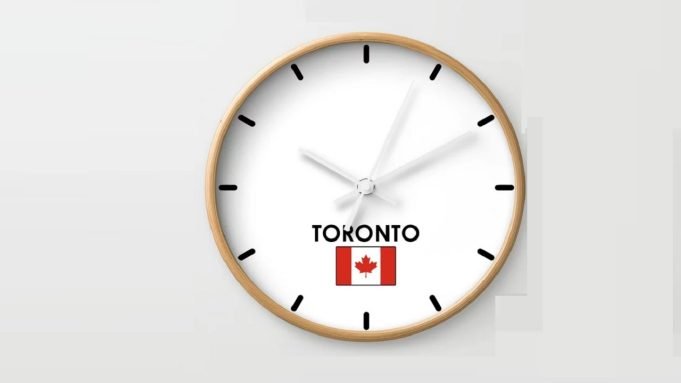Toronto is located in the Eastern Time Zone (ET) of North America. This can be either Eastern Standard Time (EST) or Eastern Daylight Time (EDT), depending on the time of year:
- Eastern Standard Time (EST): UTC -5 hours
- Eastern Daylight Time (EDT): UTC -4 hours
Daylight Saving Time usually starts on the second Sunday of March and ends on the first Sunday of November, but this can vary based on legislative decisions. During Daylight Saving Time, the time is shifted forward by one hour to make better use of daylight in the evening hours. This is when Toronto observes EDT. Outside of this period, it reverts back to EST.
What time zone in Toronto?
Toronto is generally in the Eastern Time Zone (ET) of North America. Eastern Time (ET) is UTC-5 during Standard Time, and it becomes UTC-4 during Daylight Saving Time (DST), which is usually observed from the second Sunday in March to the first Sunday in November. Therefore, during DST, Toronto is in the UTC-4 time zone. Please note that local regulations can change, so it’s a good idea to check the current time zone and any daylight saving time adjustments if you need the exact time.
Also Read: Seattle Time Zone
History of Toronto Time Zone
Toronto, located in the province of Ontario, Canada, has experienced several changes in its time zone history. While the specific details of every change might be quite detailed and extensive, below is a general overview of the history of time zones in Toronto:
1. Local Mean Time:
Before Standard Time Zones: Prior to the adoption of standardized time zones, local mean time was utilized, which was based on the position of the sun.
2. Standard Time Zones:
1884: The Prime Meridian and Greenwich Mean Time (GMT) were established, laying the foundation for worldwide time zones. The system divided the world into 24 time zones, each one covering 15 degrees of longitude.
1895: Toronto adopted Eastern Standard Time (EST), which is 5 hours behind GMT. This was a result of the push towards standardizing time across the rapidly-expanding railway networks, to avoid scheduling confusion.
Standard Time Act of 1918: The United States formally adopted time zones, and due to the interconnectedness of Canada and the US, especially in trade and transportation, Canada’s time zones aligned closely with those of its southern neighbor.
3. Daylight Saving Time (DST):
1918: The concept of DST was first introduced in Canada. DST involves setting the clock forward by 1 hour during warmer parts of the year (typically between spring and fall) so that evenings have more daylight.
1966: The Uniform Time Act was established in the United States to synchronize DST across the country.
Also Read: Pennsylvania Time Zone
Daylight Saving Time in Toronto
Daylight Saving Time (DST) in Toronto, Canada typically begins on the second Sunday in March and ends on the first Sunday in November. During DST, clocks are set forward by one hour to make better use of natural daylight during the evening hours.
To get the current status of Daylight Saving Time in Toronto, including the exact start and end dates for the current year, it’s best to check a reliable source such as a world clock website, a local news website, or a timekeeping app as the dates may change from year to year.
Is Toronto the same as New York time?
No, Toronto and New York do not have the same exact time, but they are in the same time zone for most of the year. Both cities are located in the Eastern Time Zone (ET) in North America. However, there is one exception: Toronto and the rest of the province of Ontario observe Daylight Saving Time (DST), while New York and the state of New York also observe DST. During DST, clocks are set forward by one hour in the spring and set back by one hour in the fall.
So, for most of the year, Toronto and New York will have the same time. However, during the period when DST is in effect, Toronto will be one hour ahead of New York because it springs forward and falls back at slightly different times due to local regulations. DST typically begins on the second Sunday in March and ends on the first Sunday in November in both locations, but it’s always a good idea to double-check the current time difference, as local rules can change.
Also Read: St Louis Time Zone
Is Toronto time zone EST or EDT?
Toronto’s time zone alternates between Eastern Standard Time (EST) and Eastern Daylight Time (EDT) throughout the year, depending on whether Daylight Saving Time (DST) is in effect or not.
- Eastern Standard Time (EST): This is UTC-5:00, and it is used during the non-DST period, typically from the first Sunday in November to the second Sunday in March.
- Eastern Daylight Time (EDT): This is UTC-4:00, and it is used during the DST period, typically from the second Sunday in March to the first Sunday in November. During EDT, the clocks are set one hour ahead of EST to make better use of natural daylight during the evening hours.
So, to answer your question, Toronto is currently in Eastern Daylight Time (EDT) if Daylight Saving Time is in effect, and it is in Eastern Standard Time (EST) when Daylight Saving Time is not in effect. Please note that the transition dates between these time zones may change slightly from year to year, so it’s always a good idea to verify the current time zone information for Toronto for the specific year you are interested in.
Is Toronto Central time?
No, Toronto is not in the Central Time Zone. Toronto is in the Eastern Time Zone (ET), which is UTC-5:00 during Eastern Standard Time (EST) and UTC-4:00 during Eastern Daylight Time (EDT) when Daylight Saving Time is in effect. Central Time Zone (CT) is one hour behind Eastern Time, so it is UTC-6:00 during Central Standard Time (CST) and UTC-5:00 during Central Daylight Time (CDT) when Daylight Saving Time is observed in regions that use Central Time.
Toronto, located in the province of Ontario, follows Eastern Time. Please note that time zone boundaries can change, and some areas near the border between Eastern and Central Time Zones may observe Central Time, but Toronto itself is firmly in the Eastern Time Zone.
Also Read: Austin Texas Time Zone
Is Ontario the same as Toronto?
No, Ontario is not the same as Toronto. Ontario is a province in Canada, and Toronto is a city located within the province of Ontario.
Ontario is the most populous province in Canada and is located in the eastern part of the country. It is known for its diverse cities, landscapes, and industries. Toronto is the capital city of Ontario and the largest city in Canada. It is located in the southern part of the province, near the shores of Lake Ontario. Toronto is a major cultural, financial, and economic hub in Canada and is known for its multicultural population and iconic landmarks.
So, to clarify, Toronto is a city within the province of Ontario, and Ontario is a larger administrative region that includes various cities and municipalities in addition to Toronto.
Why you should follow the Toronto Time Zone when you travel?
Following the local time zone of your travel destination, including Toronto, is important for several reasons:
Synchronization: Adhering to the local time zone helps you synchronize your activities with the local population, businesses, and institutions. This ensures that you can make appointments, conduct business, and engage in cultural or recreational activities at appropriate times.
Avoid Confusion: Traveling across time zones can be confusing, especially when scheduling flights, trains, or other transportation. Sticking to the local time zone reduces the risk of missing connections or appointments due to time discrepancies.
Health and Well-Being: Jet lag, which results from crossing multiple time zones, can disrupt your sleep patterns, digestion, and overall well-being. Adjusting to the local time zone gradually can help mitigate the effects of jet lag.
Efficient Planning: Tourist attractions, museums, restaurants, and stores typically operate on schedules that align with the local time zone. Adhering to the local time allows you to plan your activities efficiently without running into issues related to opening and closing times.
Communication: Staying in sync with the local time zone makes it easier to communicate with local contacts, whether for business or personal reasons. It ensures that you can reach people when they are available.
Safety: Staying in the local time zone can contribute to your safety. For instance, if you’re traveling for outdoor activities like hiking or skiing, being aware of daylight hours is crucial for safety planning.
Legal and Administrative Purposes: When dealing with visas, permits, or legal matters in your travel destination, adhering to the local time zone is essential to meet deadlines and requirements.
Also Read: Detroit Time Zone
Which country is 6 hours ahead of Toronto?
There are several countries that are 6 hours ahead of Toronto, Canada, depending on the time of year and the observance of Daylight Saving Time (DST). When Toronto is on Eastern Standard Time (EST), which is UTC-5:00, there are countries in the Eastern European Time Zone (EET), which is UTC+2:00, that are 6 hours ahead.
Some countries that are 6 hours ahead of Toronto during EST include:
- Greece
- Finland
- Bulgaria
- Romania
- Israel (when DST is not in effect)
- Egypt (when DST is not in effect)
Please note that the time difference may vary due to the observance of Daylight Saving Time in some of these countries. It’s essential to check the current time zone and DST status for the specific location you’re interested in for the most accurate information.
Conclusion
Toronto is a vibrant and diverse city located in the province of Ontario, Canada. It is known for its rich cultural tapestry, economic significance, and iconic landmarks. Toronto operates on Eastern Standard Time (EST) during the non-Daylight Saving Time (DST) period and Eastern Daylight Time (EDT) when DST is in effect, typically in the spring and summer months. Understanding the time zone and its transitions in Toronto, as well as the distinctions between Ontario and Toronto, is essential for accurate scheduling and coordination when dealing with this dynamic and multicultural Canadian city.
















[…] Ontario: Known for its vibrant escape room scene, Toronto offers a plethora of options with themes ranging from historical mysteries to science fiction […]
Comments are closed.